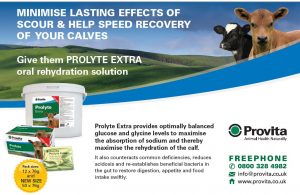FIGHT SCOUR CAUSING AGENTS WITH PROVITA PROTECT POM-VPS
Calf scour is still the most common disease in young unweaned calves accounting for 50% of all calf deaths (ADAS Report). Prevention of calf scour outbreaks requires implementation of good farm management practices. This would include supply of high quality colostrum, be that maternal or branded replacer, timely vaccination of the mother against known scouring causing agents and administration of a medicinally licensed probiotic, Provita Protect POM-VPS.
Despite best practices and management, calf scour can still occur, therefore it is imperative to monitor calves daily to make swift interventions if required.
Rehydration and scour recovery
Calves can lose 5 to 10% of their body weight in water within 1 day of scouring. To put this into context, fluid loss in excess of 8% requires intravenous (IV) drip treatment, highlighting importance of timely electrolyte intervention at first observation of illness as this will lend itself towards quickest recovery. Early signs of dehydration include dullness, lack of appetite, watery stools that may be brown, grey, green or yellow in colour and development of sunken-eyed appearance as they become more dehydrated.
So for rehydration of the scouring calf, firstly make sure calves are strong enough to take an oral electrolyte with some desire to drink and a good swallowing reflex. If calves appear weaker than this then IV therapy from your vet may be the best option.
Not electrolytes are made equal!
- All electrolytes should have:
- a readily available source of energy like glucose or dextrose;
- electrolytes like sodium, potassium and chloride to replace lost electrolytes;
- buffering agents to correct any acidosis;
- amino acids like glutamine or glycine to improve water and electrolyte uptake by the body.
- Other additives in electrolytes that can be added:
- vitamins and minerals to correct any deficiencies due to scouring;
- probiotics or prebiotics to replenish beneficial bacteria in the gut;
- gelling agents to help delay passage of fluid in the gut to give more time for nutrient absorption
Prolyte Extra contains all of the aforementioned ingredient groups, at the correct levels, to aid in the quick recovery of scouring calves. Prolyte Extra is formulated comprehensively to make a complete electrolyte so that the scouring calf gets everything it requires.
Re-establishment of gut health after scour
At times of stress e.g. scouring, the calf gut is very susceptible to an imbalance in gut bacteria composition. During this stress the trend is that the beneficial bacteria (like that contained in Provita’s Protect and Prolyte Extra) will decrease, whereas disease-causing bacteria like E. coli, has the opportunity to proliferate and cause further problems.
Therefore administration of beneficial bacteria to scouring/stressed calves seeks to re-establish the natural protective gut bacteria and return the animal to its normal nutritional, growth and health status as quickly as possible.
Provita has completed work to evidence the effectiveness of an electrolyte solution along with a probiotic in scour recovery. In published clinical report commissioned by Provita, results demonstrated that Protect and Prolyte Extra:
- Demonstrated a quicker recovery time in scouring calves;
- Accelerated the recovery of body condition to a normal healthy state in scouring calves;
- Treated scouring calves and proved to be as effective as the use of antibiotics
Milk feeding with Prolyte Extra
Calves should be fed milk as normal and beef calves allowed to suckle their mothers, along with supplemental feeds of Prolyte Extra. Prolyte Extra can also be mixed with whole milk which invariably done on days 3 and 4 of treatment to finish the electrolyte administration course.
The withdrawal of milk is now contraindicated, as it results in malnourishment and weight loss in vulnerable calves that have poorly-developed fat stores. Continued milk feeding not only provides the energy required for weight gain and growth throughout the period of scour, but also provides the nutrients that are necessary for the recovery of the intestinal mucosa.
